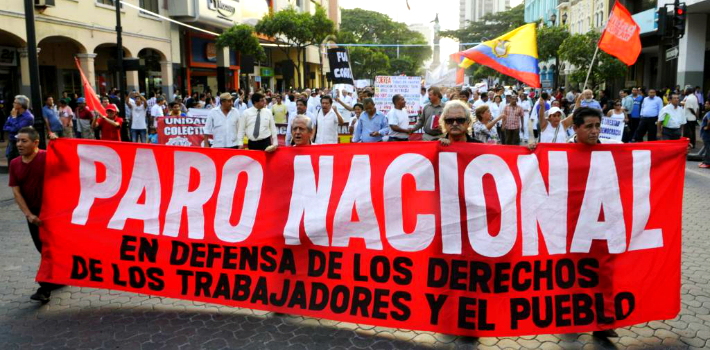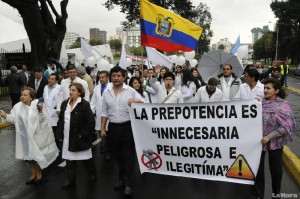
EspañolEcuadorian trade unions and indigenous groups are in final preparations for a massive nationwide strike on Thursday, August 13. Their objective is to have President Rafael Correa rectify his various policy proposals, including his plans to impose new taxes on inheritance and capital gains, which have led to a wave of protests for the past 45 consecutive days.
Other grievances include workers’ rights and proposed constitutional amendments.
The Workers
Trade union associations are among the key organizers of the national strike.
Pablo Serrano, head of the Worker’s United Front (FUT), says the demonstrations targeted reforms promoted by the ruling PAIS Alliance, including new labor regulations, 17 proposed constitutional amendments, and the recently enacted inheritance-tax bill.
The Indigenous
The indigenous community of Ecuador have also been at the heart of the protests, and got in early on the action. The Confederation of Indigenous Nationalities of Ecuador (CONAIE) launched their own protest on August 2 with a 10-day, 800-kilometer march from the Ecuadorian Amazon to Quito. Once they arrive at the capital, they plan to join the other demonstrations against Correa.
Their goal is to prevent the enactment of various constitutional amendments proposed by Correa, including those that would grant him the authority to seek indefinite reelection. CONAIE members are also demanding the repeal of Decree 16, since they say the executive order “removes autonomy from social organizations.” Furthermore, the group have called for an end to what they describe as the extraction-based economic model, the rising cost of living, and the heavier tax burden.
The March for Dignity, which has already passed through the provinces of Azuay, Cañar, Chimborazo, and Cotopaxi, is expected to arrive in Quito on Wednesday, August 12.
“Despite the obstacles set up by the Interior Ministry, a massive crowd of 20,000 marchers went through [the city of] Latacung,” CONAIE stated in a press release. CONAIE also noted via Facebook that an “enormous and disproportionate presence of anti-riot police agents” attempted to provoke demonstrators and block their way to Quito.
The Retired
Senior citizens will join Thursday’s protests after the government decided to cut funding to pensions.
Francisco Ortiz, head of the National Convention of the Pensioners Front, says over 35 senior citizens’ organizations plan to be part of the protest. He explains that pensioners are demanding changes in the administration of Ecuador’s Social Security Institute (IESS).
Ortiz also claims that the National Confederation of Pensioners — the only organization recognized by the IESS — is comprised of people who “have green blood running through their veins,” referring to Correa’s party colors.
Physicians and Lawyers
The Ecuadorian Medical Federation announced late last week that they would join the #13A demonstrations, to “defend the labor rights and regulatory certainty in health practice in the country.” The organization opposes the creation of the Health Care Services Agency (ACESS), which Correa established with Decree 703.

The Medical Federation claims that the government promised to discuss all future regulations over professional liability included in the Organic Health Code, but that officials betrayed them when they suddenly ceased negotiations and created the ACESS.
In addition, the National Federation of Lawyers of Ecuador announced in a press release that they too will join the national strike on Thursday. The organization claims that both the legislative and judicial branches of Ecuador’s government are under “the absolute control of the executive.”
They also condemn Correa’s insults toward the union, in which he called them a “sewer where the worst crooks in the country meet.” The federation announced a National Lawyers Strike beginning Wednesday, August 12, in Guayaquil.
Correa’s Choice Words
President Rafael Correa forecasted that the national strike would be “a massive failure.” Recently, he also characterized the protests as “destabilization attempts,” and warned about a “soft coup” being organized against him.
He described a new “Cold War” emerging for left-wing governments in Latin America. In a meeting with transportation representatives, he said “We are facing a national and international right-wing revival, on top of the supposedly extreme left-wing,” with groups “infiltrated by foreign agencies of intelligence… We have information about it.”
“Now, these arrogant and cocky elites, accustomed to sacking governments, wish to return to the past. How easy it is to destroy!” he tweeted.
…difícil es construir!
TOD@S a reaccionar y demostrar nuestra indignación y rechazo al pasado.
Los ciudadanos son los que tienen que…— Rafael Correa (@MashiRafael) August 11, 2015
“We all need to show our rejection and outrage towards the past. The citizens are those who….”
…proteger las carreteras, la obra pública, todo lo alcanzado.
A trabajar con más amor de Patria este jueves y decirles a los del pasado…— Rafael Correa (@MashiRafael) August 11, 2015
“protect the roads, public works, everything that we have achieved. On Thursday, go to work with more love for the nation….”
Despite showing a tough stance, specifically regarding the inheritance and capital gains tax, on August 4 Correa made some concessions and introduced reforms to a controversial decree that angered the indigenous people.
The Myth of the Coup D’etat
Correa has insisted that behind the protests there is a a coup d’etat in the making. While he alleges that he is a victim of a campaign to overthrow him, Gabriel Hidalgo, an Ecuadorian political scientist and lawyer, calls it an “absolutely false and biased” theory. In an interview with the PanAm Post, the expert said that Correa was attempting to stigmatize his opponents.
The government has responded to protests “in the worst possible ways,” using violence and concealing information, he says.
“The government has failed [and] doesn’t understand modern politics… President Correa has remained in the past with a Cold War-style policy.” He says those in power are using a populist strategy to confront the purported good guys with the bad guys. And, of course, “they are always the heroes.”
To keep the social unrest under control, Hidalgo proposes political decentralization, bringing new faces to the cabinet, and a dialogue to address the demands of social movements.
Finally, Hidalgo said that opposition members “must think about their role beyond and after Correa.” He suggests a strategy based on two cornerstones: “an alliance of diverse political parties to agree on an agenda for constitutional reform” and “democratic competition, following the rest of the democratic Latin American nations, as an exit from the political and institutional crisis.”
 Versión Español
Versión Español












